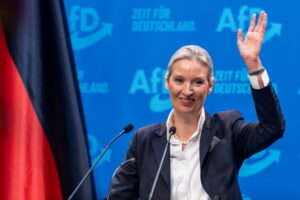The election race currently underway in Germany has many peculiarities: It coincides with the inauguration and the first days of Donald Trump’s administration in the US, it is as unpredictable as developments on the Ukrainian front and in the Middle East, it is being conducted in a Germany that for the first time is facing a serious economic crisis, with a far-right party that is no longer a political pariah but a regulator of developments at the federal level as well.
At the congress of the Alternative for Germany (AfD) party in Risa, Saxony, last weekend, Alice Weidel was officially elected the party’s candidate for chancellor by some 600 delegates.
With the slogan “Time for Germany”, a blue background as the party’s colour and 16 German flags flanking her, as many as the German states, Weidel made her mark: a frontal attack on the traditional parties, especially the Christian Union CDU/CSU, which leads in the polls, a harsh speech against illegal immigration e.g. As in her online conversation with Elon Musk, she rails against the woke agenda in the German education system.
The AfD also tried at the Saxony conference to show a friendly face to the youth. With modern, electronic music on live streaming for those who waited to watch Weidel’s speech and new people in the audience. After all, one of the central themes of the conference was the immediate establishment of a “new” party youth.
The until recently party youth, the organization JA (Junge Alternative), was under the crosshairs of the Federal Constitutional Office and has been officially declared an “extremist organization” since 2023. According to the agency, there was sufficient evidence that its activities “endangered” the liberal democratic order in Germany.
The proposal to establish a new party youth group was passed by two-thirds of the delegates present, and according to the congress resolution “its activities should not contradict the hierarchy and should not run counter to the principles of the party”. Its members, aged 16 to 36, should “promote the actions of party members in the best possible way”
Meanwhile, over the weekend, more than 15,000 from across Germany traveled as far as Saxony to protest against the AfD.
Meanwhile, the latest poll by the Insa Institute on behalf of Bild is again causing concern. For the first time, the AfD climbs to 22% and gains half an additional point after both the Mask-Weidel debate on Platform X and the obtuse statements about “communist Hitler”.
The Christian Union CDU/CSU under chancellor candidate and Christian Democrat president Friedrich Murch drops one point to 30%, with the gap between first and second parties moving to 8% for the first time.
Olaf Scholz’s Social Democrats come in third, slightly stronger on 16%, followed by the Greens on 13% and Sarah Wagenknecht’s Alliance on 6%. The Liberals and the Left, according to the new poll, are out of parliament.
Ask me anything
Explore related questions





